Ancient Greece: Notable Philosophers (and their Philosophies and Concepts, Most Famous Works, and Notable Biographical Information) and Notable Movements/Branches/Schools of Philosophy (& their Associative Philosophers and Characteristics) | Set #3: Worse Set (HISTORICAL Set)
1/29
There's no tags or description
Looks like no tags are added yet.
Name | Mastery | Learn | Test | Matching | Spaced |
|---|
No study sessions yet.
30 Terms
Ionian School (All Facts)
Group of Greek intellectuals in the namesake cities in Anatolia that radically changed the way men thought about the world around them and the universe beyond challenging traditional myths and legends
Reject the notion of the gods meddling with the natural world
For them, thunder is not a loud noise made by an angry Zeus but can be explained in natural terms
For them, Iris may be goddess of the rainbow, but a rainbow is simply a multicolored cloud of moisture
Develop the “Cosmos” meaning “the universe” idea, in which they posit that the universe, including our own world, are arranged in an orderly fashion and can be studied and explained by reasoning
They do not just make assertions but support their opinions with reasoned argument
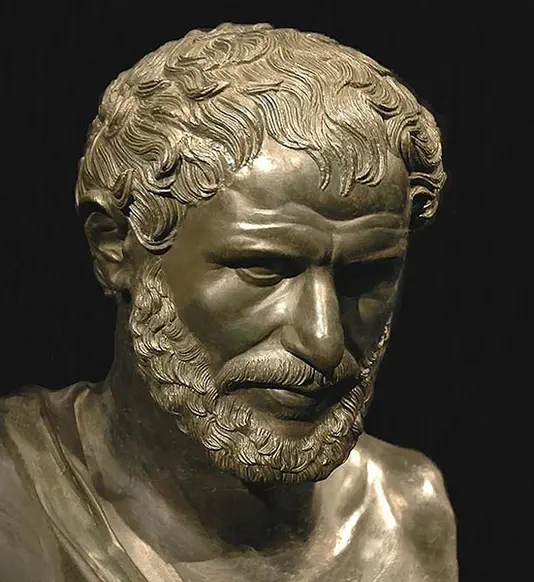
700’s BCE - 600’s BCE - Heraclitus of Ephesus (All Facts)
Greek Philosopher
Nicknamed “The Riddler”
The Greeks were baffled by his theories
Argued that the universe is governed by the conflict of opposites and that everything is achieved by discord
Believed that the elements were caught up in an endless cycle of transformation which starts from fire, the primordial element or “Principal Substance”
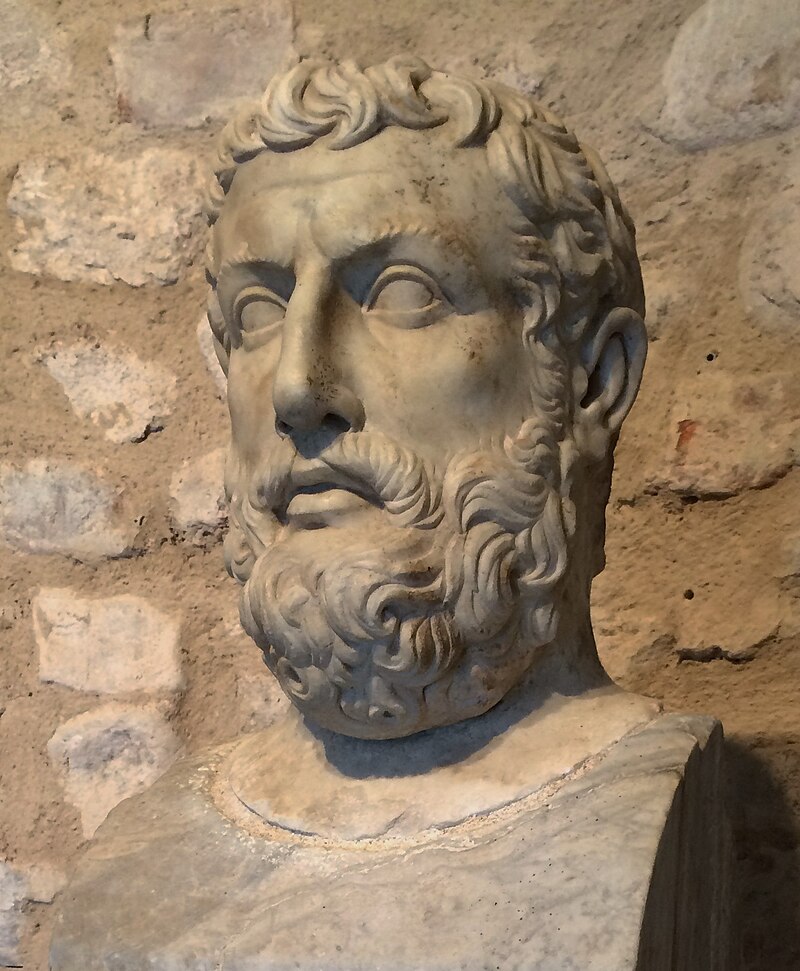
700’s BCE - 600’s BCE - Parmenides of Elea (All Facts)
Greek Philosopher
Proponent of monism
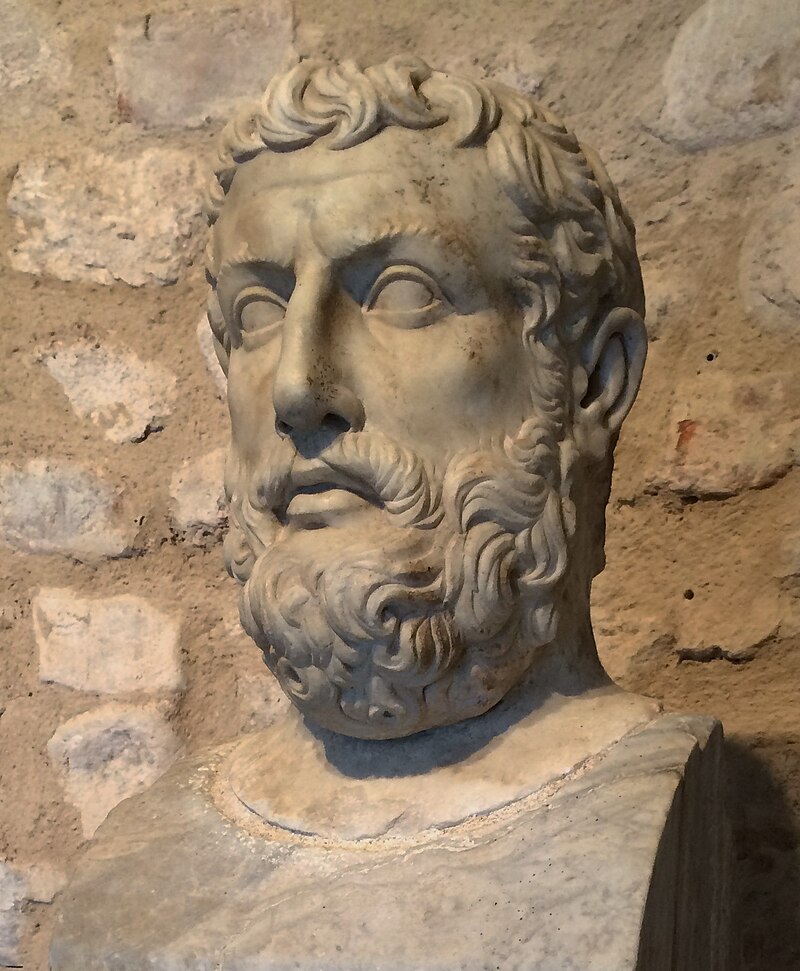
700’s BCE - 600’s BCE - Parmenides of Elea: On Nature (All Facts)
Work in which the author argues that nothing changes
It begins with a revelation: his chariot is carried towards daylight by the daughters of the sun and arrives at the palace of Dike, goddess of justice, who proclaims that his destiny is to know everything
He learns that all one is entitled to do is affirm existence
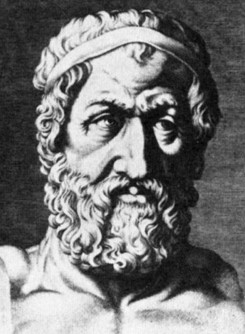
490 BCE - 430 BCE - Zeno of Elea (All Facts)
Greek Philosopher
Student of Parmenides
'Argued that, by running, Achilles will never catch up with a tortoise if it sets off before him because, in theory, the distance between them is infinitely divisible
Tried to demonstrate that unity is self-contained
Tortured for his part in a conspiracy against a Greek tyrant
Opposed the Pythagoreans
494 BCE - 434 BCE - Empedocles of Acragas (All Facts)
Greek Philosopher
Regarded as a magician
494 BCE - 434 BCE - Empedocles of Acragas: On Nature (All Facts)
Didactic poem in which the author maintains that the four elements that compose the world - air, fire, earth, and water - are governed by the opposing forces of love and strife (discord)
490 BCE - 420 BCE - Protagoras of Abdera (All Facts)
Considered by some to be the leader of the Sophists
Believed in the doctrine that “man is the measure of all things”
Wrote about the art of dialectic
Wrote about eristic, a rhetorical technique enabling one to get the better of an opponent in an argument
Threated with a charge of impiety, he fled Athens
The Sophists (All Facts)
Essentially, they promoted knowledge, wisdom, and debate for knowledge, wisdom, and debate’s sake
Group of intellectuals who traveled throughout Greece and made their living by showing off their knowledge
For a fee, they would argue, conjecture, and pontificate for hours in the marketplace with anyone who was willing to pay them to do so; and took enormous pleasure in doing so - creating puzzles and debating them for hours on end
Offered exclusive seminars to the rich
Happily set up a public debate with each other on any subject - mathematics, astronomy, genealogy, politics, insoluble chickens, etc.
Characterized by their gargantuan philosophical arrogance
Plato dismissed them as pretentious
Socrates likened them to prostitutes because they sold wisdom for money
Whenever one of their adherents appeared in a city, they attracted a large audience
They taught the art of rhetoric - argument that appears convincing regardless of the subject matter; which was a valuable skill to have in a country where almost all decisions made were done so on the grounds of much discussion concerning them
Some of its most famous adherents are Protagoras, Prodicus, and Hippias
470 BCE - 399 BCE - Socrates (All Facts)
Considered the “Father of Western Philosophy”
Known for having devised and practiced his namesake method, in which one got at the truth by repeated questioning
This gained him a high reputation among young Athenians, who flocked to his side to study his methods (such as Alcibiades)
They would then go off and make people contradict themselves as they struggled to answer question after question
Was condemned by his fellow citizens after a trial in which many believe he had been framed
He was accused of corrupting the youth of the city and failing to worship the proper gods
He denied the charges, but devoted most of his long speech to the court to defending his lifestyle
He said that he preferred to live in poverty and go barefoot rather to seek honors and riches
He cheekily suggested his sentence should be a pension for life as a reward for helping Athenians to find virtue and wisdom
The court promptly voted for the death sentence despite his rhetoric in defense
In prison, he was handed the statutory cup of hemlock which he raised to his lips; having refused to take the opportunity to escape
The Oracle at Delphi had claimed to him that no man was wiser than him, but he could not believe it himself
So he called on some of the politicians who had a reputation for wisdom and questioned them
The effect of his questioning was to bring out the fact that though they thought they were wise they were in fact ignorant
He acknowledged his ignorance, so he had the advantage; whereas the politicians, who did not, were humiliated and thus nursed their grievances
Served in the Peloponnesian War
Served briefly as a city councilor
428 BCE - 347 BCE - Plato (All Facts)
Greek philosopher
Student of Socrates
Teacher of Aristotle
Spent his youth travelling to many foreign places
Opened his own school just outside the city of Athens in a garden dedicated to the mythical hero Academus called the “Academy”
Founder of the “Academy” at Athens
Expressed his philosophical views in lectures that took the form of conversations or “dialogues,” in which he does not take part but rather others do, such as his teacher Socrates
His most famous, the “Republic” embodied his influential theories on universality via these “dialogues”
His wide-ranging dialogues discuss such questions concerning
Theories of knowledge
Acquisition of wisdom
The difference between right and wrong
Whether democracy or autocracy is better
Argued that ideas have an independent existence and are the archetypes of all concrete things
Pondered on the relationship between the human soul, the state (government), and the universe
After he left Athens after Socrates’s death, he spent some time at the court of Dionysius in Sicily, an experience which led him to argue that a just state will only come into existence when
Its philosophers become its rulers
Its philosopher-rulers
abolish
Private Property
The Family
introduce
Eugenic mating
an educational system to train each citizen for its place in society
In his “Academy", he brought together like-minded scholars to talk about this idea of the “ideal Republic” among other issues
Believed that the three years which the Athenian youth devoted to music were inadequate to protect them form the boorish emotionalism of the new wave of musicians whose music shocked the older generation
Before withdrawing to the world of pure ideas, he tried to convert Dionysius of Syracuse into his emerging philosophical tradition
Dies at a wedding feast
428 BCE - 347 BCE - Plato: The Symposium (All Facts)
Philosophical dialogue and comedy about manners
Its characters include Socrates, Aristophanes, and Alcibiades (in the role of an inebriated reveler)
At the namesake location, drinking its interspersed with philosophical conversation
In it, each participant must give a eulogy to love
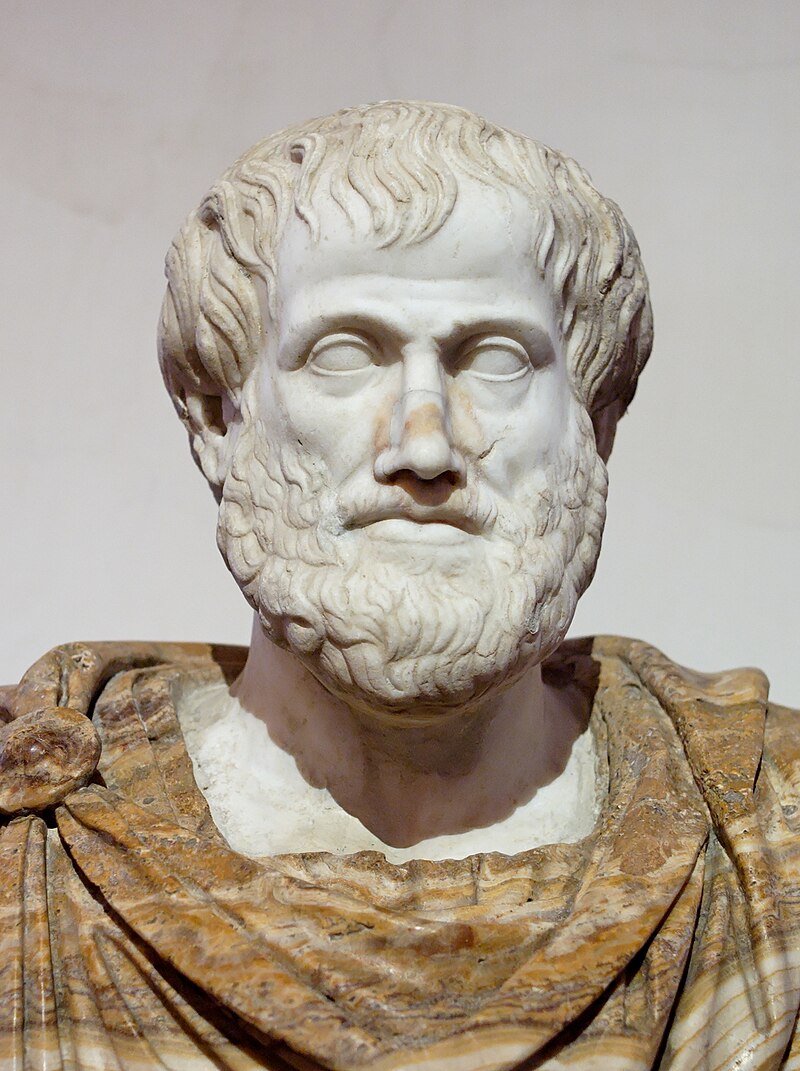
384 BCE - 322 BCE - Aristotle (All Facts)
Greek philosopher and scientist, physician and tutor
Known for his lectures on logic, in which he introduced his students to the syllogism and concepts like the major premise, minor premise, and conclusion
It showed students what they must do in order to prove something
Changed the way scholars in Ancient Greece thought
He divided knowledge into two categories: theoretical and practical
Theoretical knowledge sought knowledge for its own sake and included subjects like philosophy, mathematics, and “theoretical” chemistry
Practical knowledge dealt with such matters like buildings, politics, and economics
Known for his writings on metaphysics, ontology (treated in his work “Categories”), the soul, and ethics (which he considered to be an extension of politics)
Founded his college, the “Lyceum” in Athens, in which he taught his students logic, a method of reasoning which he developed
Was part of his innovative approach to the whole question of human knowledge
In every branch of learning / curriculum at the “Lyceum", he rests his teaching on the close observation of facts
In his study of politics, he directed his students to collect 150+ different constitutions of Greek city-states in order to discover the best system of government
Student of Plato
When he was 17, he came to Athens to study under him until his death 20 years later
Many expected him to succeed his teacher as head of the Academy
When that did not happen, he left and became a tutor for Alexander the Great
His father was physician to King Philip II of Macedonia
334 BCE - 262 BCE - Zeno of Citium, Cyprus (All Facts)
Was a Hellenistic philosopher
Founder of Stoicism
The name comes from a painted portico in Athens from which he taught called the Stoa Poikile
Observing the decay of religious faith and social ties, he took to explaining his ideas in the painted stoa, or colonnade, of the market place, from which the name of his school derives
Taught his philosophy in Athens
Based on the moral ideas of the Cynics and the philosophy of Cynicism
279 BCE - 206 BCE - Chrysippus of Soli (All Facts)
Considered the “Second Founder of Stoicism”
Succeeded Cleanthes as head of the Stoic School
Famous for having died from laughing at his own joke
Stoic School / Stoicism (All Facts)
Founded by Zeno of Citium of Cyprus
Taught that virtue, which is based on knowledge, is the only good
Laid great emphasis on goodness and peace of mind gained from living a life of virtue in accordance with nature
Believed that men could be delivered from fears and desires that made them unhappy by accepting the world as it is and seeking happiness within themselves
So long as happiness depends on others, or on anything over which men have no control, they will be a prey to anxiety and disappointment
Was one channel by which Greeks sought reassurance and happiness in new beliefs after having begun to lose their moral bearings prior
It proved very popular, and flourished as one of the major schools of philosophy from the Hellenistic period through to the Roman era
The name of the school is named after Athens’ painted portico, Stoa Poikile, under which Zeno of Citium taught
Characterized by a distrust of the autocratic regimes of Hellenistic Greece
341 BCE - 270 BCE - Epicurus (All Facts)
Greek philosopher
Believed pleasure is the chief good
Founds his namesake school of philosophy in Athens, which taught both men and women
Epicurean School / Epicureanism (All Facts)
Founded by the namesake Athenian philosopher
Believe that although people seek pleasure they must avoid excesses which lead to pain
Believe that one should lead a simple life and avoid
Public ambition
The pursuit of success
Marriage
Argued that, to achieve maximum pleasure and cause the least possible distress, it is advisable to lead a simple life, free of ties and unencumbered by wealth
Characterized by a distrust of the autocratic regimes of Hellenistic Greece
Two of its philosophers were expelled in 173 BCE by Roman authorities which alleged that their moral code, which was based on the theory that pleasure is the highest good, had corrupted the young
Skeptic School / Sceptics / Skepticism (All Facts)
Believed that whatever argument may be produced in support of a belief, just as strong arguments can be found to refute it
They believe that the wise man has no opinion about anything other than that which he has seen and felt
Eventually took over Plato’s “Academy”
Cynic School / Cynics / Cynicism (All Facts)
Believed that one should be indifferent to all worldly things (riches, honor, freedom, health), in their pursuit of virtue
They lived without family or religion
They made a great show out of their poverty
Characterized by a distrust of the autocratic regimes of Hellenistic Greece
185 BCE - 109 BCE - Panaetius (All Facts)
Greek Stoic Philosopher
He lived in Greece but moved to Rome
He adapted Stoicism to serve the needs of statesman and soldiers in Rome
Through him, Stoicism spread widely among the Roman upper classes
He and his disciples
discussed such questions as how a good man would act in circumstances where he faced a conflict of duties
believed that the philosopher should try to help people who fall below the lofty ideals espoused by “pure Stoics”
In other words, sinners should be offered hope of salvation
155 BCE - Main Events (All Facts)
Year in which representatives of Athens’ three great schools of philosophy by that time: the Stoa Poikile, the Academy, and the Lyceum, were sent on a mission to Rome
Epicureans, who were not in favor with the Roman authorities, were excluded
40 - 120s - Plutarch, as Philosopher (All Facts)
Greek Philosopher
Priest at Delphi
Follower of Plato
50 - 135 - Epictetus (All Facts)
Greek Stoic Philosopher
Was a former slave
Advocated self-denial and indifference to suffering
Taught that the universe is the work of God
Died at Nicopolis in Epirus, where had lived since he was banished from Rome by Domitian in 89 CE
117 - 181 - Aelius Aristides (All Facts)
Greek Orator and Writer
Delivered a famous speech he called “in praise of Rome,” in which he
Poured praise on the city of Rome, its Emperor, and its people which was flattering considering his Greek identity
Said that the government of Rome combined all the good qualities of kingship, aristocracy, and democracy without their bad aspects
Listed the benefits of being a Greek in a Roman colony
His work was part of a renaissance of Greek letters alongside that of his contemporaries Dio of Prusa and Herodes Atticus
170s CE - Celsus (All Facts)
Greek Philosopher
170s CE - Celsus: The True Word (All Facts)
First comprehensive and reasoned critique of Christianity
86 CE - 180 CE - Arrian of Cappadocia (All Facts)
Greek Philosopher born in Nicomedia in Bithynia
He was a pupil of Epictetus
He was responsible for preserving Epictetus’s work “Discourses”
204 - 270 - Plotinus (All Facts)
Greek Philosopher and Neo-Platonist
He believed that there are concentric circles of reality centered on the sublime source of existence and valued, with an outer circle of bare matter
He stated that man was a microcosm of this principle and that man can attain the inner sublime state through ecstasy
He revived and extended the work of Plato
Born in Egypt
He studied philosophy in Alexandria
He then settled in Rome and attracted a circle of intellectuals
Died of diphtheria in Campania